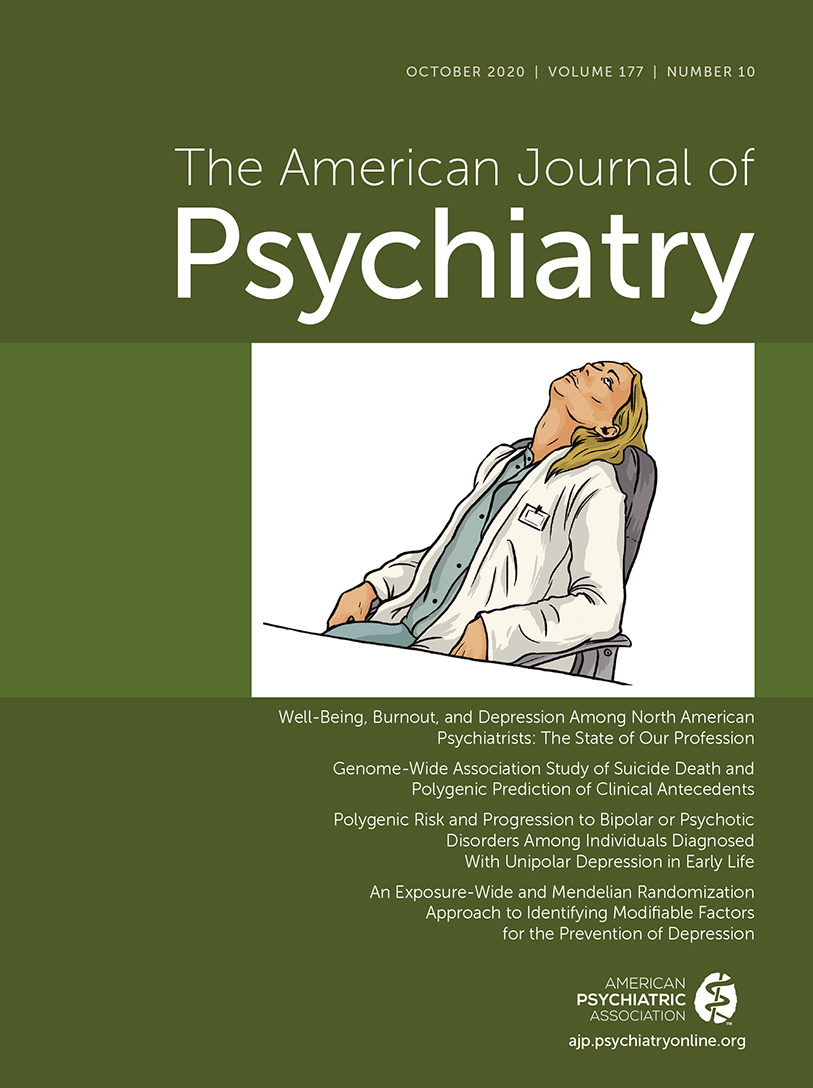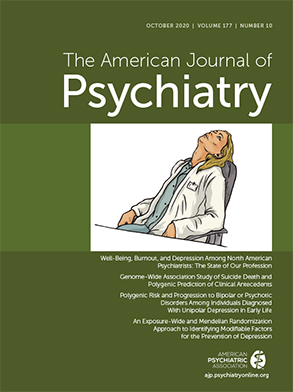The lifetime prevalence of major depressive disorder in women is approximately double that of men, a striking gender imbalance that first emerges in adolescence. Over a woman’s lifetime, discrete risk periods for mood fluctuations and emergent depressive symptoms (e.g., premenstrual, postpartum, menopause) may further complicate the course of depressive illness. The menopause transition is a particularly vulnerable period for the development of major depression and depressive symptom exacerbation.
Hormonal interventions that target the hypothalamic-pituitary-gonadal axis have a long, complex, and mixed track record for the treatment of depression and related conditions. Estrogen replacement therapy or combined estrogen and progestin hormone replacement therapy and allopregnanolone (a progesterone metabolite) are the best studied ovarian hormonal interventions for depression in women (
1). A recent review by the American Psychiatric Association Council of Research Task Force on Novel Biomarkers and Treatments (
1) found moderate evidence of efficacy of estrogen replacement therapy or hormone replacement therapy for perimenopausal or early postmenopausal women with major depression and physical symptoms of menopause (e.g., hot flashes, vaginal dryness). In 2019, an analogue of the endogenous human hormone allopregnanolone (intravenous brexanolone) was approved for postpartum depression in the United States (
2), marking the first regulatory success of a neurosteroid hormone for a psychiatric disorder. Allopregnanolone is derived from progesterone, which is itself derived from pregnenolone in the cholesterol biosynthetic pathway. Pregnenolone’s alternative metabolic pathway includes dehydroepiandrosterone, a precursor to testosterone and estradiol.
In males, testosterone is indicated for replacement therapy for individuals with congenital or acquired primary hypogonadism (e.g., testicular failure) and hypogonadotropic hypogonadism (e.g., luteinizing hormone–related hormone deficiency or hypothalamic-pituitary injury). In females, the physiological role of testosterone (produced by the ovaries, adrenal glands, and brain) is not as well characterized, although its functional effects on bone density, skeletal muscle growth, sexual functioning, and development of secondary sexual characteristics appear similar to those in males (
3). Testosterone levels in women decline with age, independent of menopausal status (
4). Testosterone replacement has been studied off-label in women with hypoactive sexual desire disorder (
5,
6) and androgen deficiency with hypopituitarism (
7), among other indications.
With the exception of testosterone replacement for hypogonadal men, the evidence for testosterone’s antidepressant effects is modest (
1). To date there have been no published placebo-controlled trials in women with major depression. Nonetheless, in clinical practice, women are prescribed off-label male-branded or compounded testosterone, in the form of topical gels, transdermal patches, buccal formulations, or injections. It is in this context that the new study by Dichtel and colleagues in this issue of the
Journal (
8) is a welcome addition to the literature, and of interest to both clinicians and researchers.
Dichtel and colleagues report the results of a National Institute of Mental Health–funded clinical trial of adjunctive transdermal testosterone cream in 101 pre- and postmenopausal women ages 21 to 70 with antidepressant-resistant major depression. This 8-week, randomized, double-blind, placebo-controlled trial, conducted at two academic medical centers in the United States, was rigorously designed and carefully executed. The trial design was shaped by these investigators’ previous small open-label study in women with treatment-resistant depression, which showed promising response and remission rates after 8 weeks of treatment (
9). The new trial results were disappointing: low-dose testosterone administered daily did not show efficacy compared with placebo. Testosterone also failed to show benefit for fatigue and sexual function. These are important negative findings, inasmuch as varied hormonal interventions have been adopted in clinical practice despite minimal supportive evidence. On the positive side, the study confirmed the large body of evidence that low-dose transdermal testosterone is a safe and tolerable therapy for women (
10). The most common side effects of acne, hot flashes, and headache, reported in >5% of participants, were observed in both the testosterone and placebo groups.
The trial had numerous methodological strengths. Most critically, study participants underwent blood draws for serum and free testosterone at each visit, which enabled individualized dose titration based on free testosterone levels compared with age-adjusted norms. An additional and nontrivial benefit was confirmation of medication adherence, which can never be assumed in clinical trials. The 8-week trial duration permitted a sufficiently long period to fully assess the time course of therapy (
11), and contrasts to recent trials in major depression and treatment-resistant depression in which the primary endpoint was earlier (i.e., 2–6 weeks) (
12–
15). Even with this trial duration, the attrition rate was relatively modest, at 14%. The frequency of visits (every 2 weeks) over the 8-week study period was a pragmatic trade-off balancing potential placebo effects resulting from more frequent clinician contact with the need for individualized dose titration. There was also a nice integration of conventional depression outcome measures with rating scales particularly relevant to testosterone therapy (e.g., sexual function, fatigue).
Finally, the trial was conducted at only two sites with extensive experience in the diagnosis and management of patients with depression. The two sites demonstrated acceptable interrater reliability on the primary outcome measure. The low number of sites stands in contrast to a typical industry-sponsored phase 2 or 3 major depression trial in which multiple sites are enlisted, each contributing only a small number of patients. While conducting a trial at just a few expert sites may enhance quality control and operational efficiencies, there are trade-offs with respect to speed of trial completion. The study enrollment period of more than 3 years (as reported at ClinicalTrials.gov, NCT01783574) is notably longer than a typical industry study of this size.
And yet, despite these favorable design features, the study was unambiguously negative. Do these results indicate a failed trial or a failed therapy? The former is the more likely interpretation. A critical question in interpreting a negative trial result is whether the study was sufficiently powered and whether the negative results are suggestive of type II error (i.e., false negative). The investigators predicted greater than 80% power to detect a 5-point difference in the change in Montgomery-Åsberg Depression Rating Scale (MADRS) scores from baseline to 8 weeks. This hypothesized effect size exceeds the effect size for approved augmentation agents in major depression (e.g., atypical antipsychotics) (
16) and in the end proved overly optimistic.
Nonetheless, whether the study was underpowered is moot, given the unexpectedly high placebo response rate of 49% (compared with a response rate of 47% in the testosterone group). The placebo remission rate of 44% exceeded the testosterone group’s remission rate (36%) by an even larger magnitude. As discussed by the authors, clinical trials in major depression in which the placebo response rate exceeds 40% are rarely capable of showing a statistically significant benefit for the experimental therapy (
17). The placebo response rate “sweet spot” for trial success is generally in the range of 20%−30%. So while testosterone therapy’s performance was similar to expectations based on a pilot study, the exaggerated placebo response prevented a reasonable chance for a favorable outcome.
Several trial features may have contributed to an inability to detect a signal for testosterone efficacy. Trial participants comprised a markedly heterogeneous group in terms of age, menopausal status (both postmenopausal and premenopausal women were included), depression severity (mild symptoms denoted by a minimum MADRS score of 12 were allowed), and treatment resistance (the number of failed antidepressant trials in the current depressive episode ranged from one to three). Moderator analyses found that there was no interaction between menopausal status, depression symptom severity, baseline free testosterone levels, and treatment group, however. No information was provided on additional sources of potential heterogeneity, such as race or ethnicity, age at onset, duration of illness, classes of concomitant psychotropic medications, and use of non-androgen hormonal preparations. The fact that the experimental therapy was a topical cream, instead of the typical orally ingested pill or capsule, could have inflated patient expectancies. Even in treatment-resistant populations, atypical routes of drug administration (e.g., intravenous) have been associated with robust placebo responses in short-term depression trials (
18,
19).
This trial was conceptualized prior to the National Institute of Mental Health’s endorsement of an experimental therapeutics framework for early-phase clinical drug development. This framework encourages studies to focus on mechanistic biomarkers of brain target engagement before embarking on trials with traditional clinical outcomes (
20). Implicit in this approach is that demonstrating “proof of mechanism” in a small (and often underpowered) trial is a more reliable success indicator for subsequent larger clinical trials than relying solely on clinical response. While pre- and posttreatment functional MRI (fMRI) was performed in this trial, only 18 of 101 study participants underwent scanning. There were no differential changes between the testosterone and placebo groups in activation of the dorsal and pregenual anterior cingulate cortex in response to an emotional conflict task, which is unsurprising given the small sample size.
How would an experimental therapeutics perspective affect the conduct of this study? The primary objective would be to identify neurocircuit mechanisms that link low testosterone levels to depression in women. Testosterone supplementation would then be used as a pharmacological probe to evaluate dose-dependent changes in neurocircuit mechanisms (i.e., target engagement). This framework enables the testing of novel hypotheses, such as the potential impact of testosterone and its metabolites on GABA neurotransmission, which could be investigated via MRI techniques such as spectroscopy. A recent pilot study by this group in postmenopausal women with antidepressant-resistant depression showed promising efficacy for ganaxolone, an allopregnanolone analogue and a positive allosteric modulator of GABA
A receptor activity (
21).
An experimental therapeutics framework encourages adoption of sample enrichment strategies to constrain the profound heterogeneity of DSM-defined conditions, with the aim of enhancing signal detection. Could the sample be enriched for depressed individuals with clear-cut abnormalities in fMRI measures at baseline? A priori participant selection based on fMRI is challenging and costly, given a high proportion of expected screen failures and uncertain thresholds for demonstrating pathology. Indeed, recent large prospective biomarker-focused pharmacotherapy studies in patients with major depression did not select participants on the basis of fMRI signatures but rather on clinical diagnosis (
22,
23). The study might have restricted enrollment to postmenopausal women with low serum and free testosterone levels and associated symptoms (e.g., low libido, fatigue) and to women with more severe depressive symptoms and treatment resistance.
In sum, this first randomized placebo-controlled trial of adjunctive low-dose testosterone in women with antidepressant-resistant major depression failed to show benefit, owing to a very high placebo effect. Given testosterone’s favorable safety and tolerability and replicated evidence of improvement in depressive symptoms (albeit in the context of a failed study), further clinical trials in specific subgroups of women should be considered. The findings call for renewed efforts to investigate sex differences in the pathophysiology and treatment of depression (
24) and to further refine sex-specific antidepressant therapies. This report also highlights the imperative to develop and implement clinical trial methods for depression studies that maximize efficiency and informativeness (
25).
Acknowledgments
Dr. Mathew is supported through the use of facilities and resources at the Michael E. DeBakey VA Medical Center, Houston, and by the Menninger Clinic, Houston. The author thanks Manish K. Jha, M.D., Ana Maria Rivas-Grajales, M.D., and Rudy Lozano Carreon, M.D., for their helpful comments on an earlier draft.

